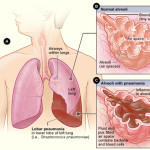Natural Antitussives and Expectorants
A cough is never a symptom to be ignored, no matter the cause. Whether it’s common cold, acute or chronic bronchitis, pneumonia, asthma, emphysema, heart disease or environmental allergies, a cough is something that needs immediate attention, if not from a specialist, at least from yourself. You can start with one of the following herbal remedies.

Marshmallow root tea
Contents
Antitussives
The following herbs have either an anesthetic effect on the lungs and throat (suppressing the cough reflex) or, due to the presence of mucilage, a protective and healing effect by which they prevent the irritation of the receptors responsible for triggering the cough reflex.
Camphor and peppermint (both have anesthetic effects): use externally, rubbed on the throat and chest, or in steam inhalations.
Iceland moss (it contains lichenin and isolichenin, two mucilaginous polysaccharides): make an infusion from 4-6 g of herb and 150 ml of water and drink it throughout the day.
Marshmallow root (it contains 5-10% mucilage; in a study published in Research in Complementary and Natural Classical Medicine in 2005, it was demonstrated that a product containing marshmallow root, thyme, aniseed and ivy leaves “seems to alleviate cough in consequence of common cold, bronchitis or respiratory tract diseases with formation of mucus”): make a decoction from 2-5 teaspoons of dried root and 150 ml of water and drink it throughout the day.
Mullein (it contains 3% mucilage): make a syrup by slowly boiling a cup of dried leaves in 300 ml of water until only half of the water remains in the recipient, then strain and add 2 tablespoons of honey. Store in the refrigerator. Take 1 teaspoon every 3-4 hours.
Plantain leaves (they contain 6% mucilage): make an infusion from 3-6 g of herb and 300 ml of water and drink it throughout the day.
Slippery elm inner bark (it contains large quantities of a particularly viscid mucilage): make an infusion from 4 g (2 tablespoons) of powdered dried bark and 500 ml of water and drink it throughout the day.
Expectorants
The following herbs act either as local irritants or as surface-tension modifiers.
Eucalyptus leaves (the essential oil in the leaves contains up to 84% 1,8 cineole; a study published in European Archives of Oto-Rhino-Laryngology in 2004 showed that 1,8 cineole is effective in the treatment of acute non-purulent rhinosinusitis, having strong mucolytic properties): make an infusion from 1 moderately cut dried or fresh leaf and 300 ml of water. Drink up to 5 cups a day.
Horehound (it contains marrubiin, which has a direct stimulatory effect on the secretions of the bronchial mucosa): make an infusion from 30 g of dried plant and 300 ml of water. Drink 3 cups a day.
Senega snakeroot (it contains certain substances that irritate the upper respiratory mucosa, thus increasing the local secretions and loosening phlegm; it also contains saponins, which act as surface-tension modifiers): make an infusion from 1 teaspoon of dried root and 300 ml of water and drink it throughout the day.
Thyme (it contains thymol, which is not only expectorant, but also antiseptic and antispastic): make an infusion from 2 teaspoons of dried herb and 300 ml of water and drink it throughout the day.



